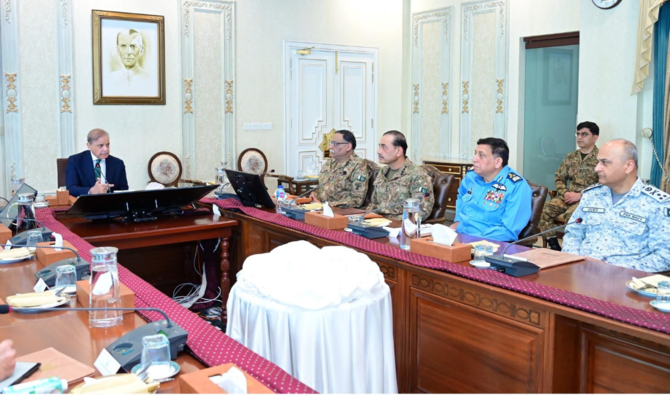LAHORE: Punjab Jail Minister Fayyaz ul Hassan Chohan said on Thursday he had ordered prison authorities to stop with “immediate effect” any preferential treatment for Zahir Zakir Jaffer and said the key suspect in the grisly murder of Noor Mukadam was being kept in solitary confinement at Rawalpindi’s Adiala Jail.
The order comes a day after Jaffer was taken to the Pakistan Institute of Medical Sciences (PIMS) after he complained of a headache, unleashing public and social media outcry over special privileges for the wealthy US national.
Mukadam, the daughter of a former Pakistani diplomat, was found beheaded at a residence in Islamabad’s upscale F-7/4 sector on July 20 in a case that has sparked public outrage and grabbed media attention unlike any other recent case.
Chohan told Arab News on Thursday Jaffer was being kept in solitary confinement in a high-security cell in Adiala Jail.
“I’ve ordered the jail superintendent that no VIP treatment should be given to Zahir or his family and he should not even be allowed to meet his father who is in another barrack at the same jail,” Chohan said in a phone interview. “They are not in jail to celebrate birthday parties.”
Chohan said hospital visits, clothing changes and other special treatment would no longer be granted to Jaffer or his family: “Zahir will have to eat jail food from now on.”
Adiala Jail Superintendent Arshad Warraich confirmed that the prison had received these orders from Chohan, adding: “No one is allowed to see Zahir as he is being kept in a tightly-guarded solitary confinement cell.”
Reports that Jaffer was taken to PIMS hospital after he complained of a headache on Wednesday afternoon, that he was receiving home cooked food in jail daily and the fact that he always appears before the district magistrate bathed and in a fresh set of clothes have unleashed widespread condemnation in Pakistan, with social media users, journalists and activists saying the suspect was being given special treatment because he belonged to a wealthy family and was a US national.
Innocent men and women who are poor languish behind bars with no protections, no legal help, no hope. But rich men who murder, abuse, rob and steal get whatever they want, no matter what they've done. Zahir Jaffer's privilege exposed like this stains all pretences of law +justice https://t.co/x3gVzqgwLJ
— fatima bhutto (@fbhutto) August 4, 2021
Jaffer was arrested on the day he murdered Mukadam last month, on the eve of Eid Al-Aha, and remained in police custody on physical remand until this Monday, when he was sent on 14-day judicial remand to Adiala Jail in Islamabad’s twin city of Rawalpindi. He will next be presented before a judicial magistrate on August 16.
Jaffer’s parents — Zakir Jaffer and Asmat Adamjee — and two members of their household staff were also arrested by Islamabad police on July 24 for “hiding evidence and being complicit in the crime.”
The parents, sent to jail on judicial remand till August 9, had moved separate bail petitions against their detention. Both were rejected by an Islamabad district and sessions court on Thursday, with Additional Sessions Judge Sheikh Muhammad Sohail issuing the written verdict.
The judgment said the parents of Jaffer were guilty of abetting the main culprit: “The parents aided the principal accused through willful concealment of facts and intentionally omitted to timely report the matter to police, in consequence thereof they facilitated their son (principal accused) to commit murder of aforenamed victim, and thereafter attempted to cause disappearance of evidences.”
The investigation and arguments, in juxtaposition with other evidence on record, sufficiently connect the petitioners and the accused with the commission of alleged offenses, the verdict read.
“It’s also noteworthy that on the day of sorrowful happening, the victim/deceased, most probably under fear of death from the hands of Zakir Jaffer (principal accused) made a desperate attempt to escape from the clutches of principal accused by jumping from the first floor of petitioner’s house, however, was caught and dragged in,” the judgment said.
“The present petitioners/accused, who were in constant contact with their son (principal accused), despite getting prompt information or aforementioned occurrence, sent personnel from a Rehabilitation Center instead of immediately reporting the matter to police, and as such, they not only caused abetment, but also made utmost effort to wipe off the evidence of the alleged crime.”
The judgment said police had added the charges of abetment, concealment, failure to share information, disappearing evidence and attempting to commit offenses punishable with imprisonment for life to the charges against Jaffer’s parents.





















